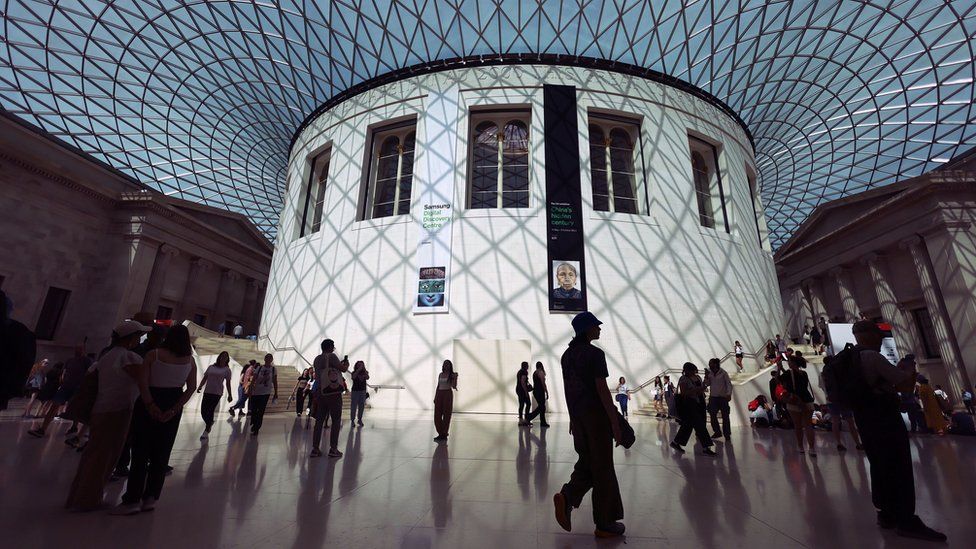
The British Museum’s outgoing director Dr Hartwig Fischer acknowledged that “the situation facing the Museum is of the utmost seriousness”
By Katie Razzall
Culture and media editor
It’s been a global story: a museum of world renown, home to some of humanity’s most prized treasures, which apparently didn’t notice that more than 1,500 items had disappeared. Thefts from cultural institutions are perhaps less rare than you might think.
But this is the British Museum.
There are eight million items in its collection, the vast majority are not on display and many are still not catalogued in a manner fit for modern times.
And for more than a week, the drip-drip of allegations has made the position of those at the top increasingly untenable.
Setting aside the person under suspicion, who this week was interviewed by police – the museum management has been under intense scrutiny about what they knew and when.
It’s been deeply damaging for them and for the institution.
Hartwig Fischer’s resignation as the museum’s director is an effort to draw a line under that. It’s also an admission that the museum made grave mistakes two years ago when it was alerted to allegations of theft.
The questions were even more serious for his deputy, Jonathan Williams.
He was involved in an investigation in 2021 after those suspicions were flagged by a dealer who had been buying gems and other items online.
The BBC was the first to see the correspondence between Dr Ittai Gradel and the museum top brass from that time.
Having written first – in February 2021 – to the deputy director of a “disturbing discovery I have made, involving theft from the British Museum, apparently by one of your curators”, Dr Gradel then wrote to Dr Fischer to ask whether the matter was being investigated.
In July 2021, Dr Williams emailed to say there had been a “thorough investigation” with “no suggestion of any wrong-doing on behalf of any member of Museum staff”.
He reassured Dr Gradel the “collection was safe”.
Dr Williams has now agreed to step back from his normal duties until the museum completes an independent review into the thefts.
Dr Gradel says: “They failed to take my warnings seriously, they refused to listen, they had no questions to ask of me, they never wanted to include me in their so-called ‘thorough investigation’.
“They never contacted me for any additional information or assistance – it is unbelievable.”
It was an error for the museum to go on the offensive earlier this week.
Dr Fischer suggested Dr Gradel had been less than candid with them when he first reported his concerns. He had, the Museum Director said, “had many more items in his possession, and it’s frustrating that that was not revealed to us as it would have aided our investigations”.
Image source, Jeff Overs/BBC
Parthenon Sculptures, which are originally from the temple of Athena in Greece, were brought to Britain by Lord Elgin
But the correspondence the BBC had seen very clearly showed that in his first contact Dr Williams, Dr Gradel had been open about how he had bought items online and now feared “at least one, possibly all of these gems in fact came from the British Museum collections.”
Dr Fischer has withdrawn the remarks and offered his “sincere regret”.
The damage of this story is still unfolding.
To some, the museum is now an international embarrassment. The Greek government has linked what’s happened to its claims for the return of the Elgin Marbles.
Others too, with ongoing restitution claims, have argued that the British Museum is no longer a trusted custodian of its collection.
Tim Loughton MP, the Conservative chairman of the all party parliamentary group for the museum, has called that “opportunistic”.
He told the BBC that other countries should be “rallying around to help retrieve objects instead of trying to take advantage”.
The trustees, led by the former chancellor, George Osborne, now need to show they have a plan to recover missing items and ensure the collection is protected into the future.








